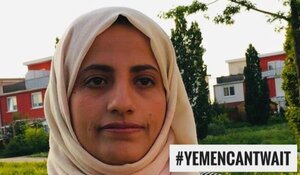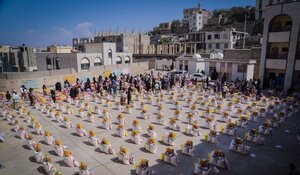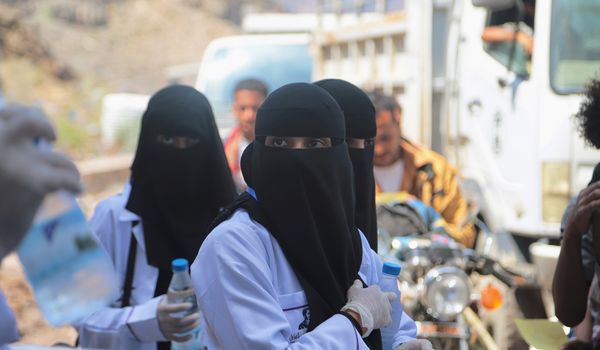Peace is the prerequisite to health, equality and human security. But conflict and war continue unabated even as the world is in the midst of the COVID-19 pandemic. And the pandemic is hitting the poorest and most marginalized hardest. In Yemen, the six-year war has left 7 million people acutely malnourished, millions displaced and a health infrastructure in shambles. On 21 September 2014, the post-Arab spring transitional process in Yemen failed (2011-2014) leading the country to a devastating war, which worsened with the intervention of the Arab coalition. The conflict in Yemen started when Houthi militias invaded the Yemeni capital and took control of state institutions and forced the Yemeni president to flee. After that, the Arab coalition led by Saudi Arabia and the United Arab Emirates (UAE) intervened in March 2015. Yemen then entered into multiple conflicts, the latest of which was the coup attempt by the transitional council with the support of the UAE in the south of Yemen claiming the secession from northern Yemen, which was unified in 1990. The conflict has become a regional conflict between Saudi Arabia and the Emirates on the one hand and Iran on the other. Nonstate actors gained power due to the abscess of the state and the destructor of services, especially the health service. Yemen was already experiencing the world’s worst humanitarian crisis and, with COVID-19, this crisis is deepening. Yemeni women now face the double burden of the war and a pandemic.
The War and Yemeni Women
Due to the ongoing war, Yemeni women face the loss of loved ones, injury, striking poverty, gender-based violence, displacement, arbitrary arrests and financial pressures on an everyday basis. Women have been illegally detained, falsely charged with prostitution and sentenced after grossly unfair trials. Once imprisoned, women are subjected to torture, poor prison conditions and the social stigma associated with their charges and imprisonment.

The work of women activists has been curtailed as Houthi militias force women-led organizations to delete the word “peace” from their interventions or risk the shut-down of their organizations or the detention of their leaders as they did to peace activist Awfaa Al-Naami. Further, both conflict parties have restricted the mobility of women so they are required to be escorted by men when they travel. At check points, they face humiliation, sexual harassment and immoral searches and sometimes even get murdered. Yet, Yemeni women are working hard to survive and, somewhat surprisingly, social norms in Yemen – where women are caregivers and responsible for the health and well-being of the family – have actually contributed to making women resilient in the face of conflict as they work tirelessly to care for their family and community and to end the war. Although there are a lot of restrictions for peace workers and for women in general, women have been working to ensure a diplomatic, non-military solution with women having a seat at the peace table. It is not an exaggeration to say that because of women’s resilience and determination, they are opening windows of hope. However, when COVID-19 hit Yemen, it all but closed these windows and opened up new and expanded challenges for women.
COVID-19 and its Impact on Yemeni Women

COVID-19 and the lock-down measures exacerbate women’s hardship and insecurity. Women face increased inequality while shouldering new COVID-19 responsibilities. Social norms cast women as care givers. In addition to their normal workload, with the pandemic, women are doing more domestic work, supervising children and taking care of the sick. Working women also face increased economic hardships. Now, small women-led businesses are being disproportionately hurt and targeted, e.g. women’s hairdressers are shutdown, while men’s barber shops remain open. Mothers are bringing children to work – and living with the fear of exposing them to COVID-19 – as childcare is lacking and schools are shut down. Regarding women’s health and the health care system, the war had already put a strain on hospitals and healthcare but the situation worsened. Now, women healthcare workers face intolerable working conditions with extended working hours and no safe, female-only in-hospital sleeping areas. Women’s health, including sexual and reproductive health continues to worsen. Even before the outbreak of Corona, one woman died every two hours from complications during pregnancy or childbirth, and only 20 percent of the health facilities provided maternal and child health services. With COVID-19, live-saving services are experiencing severe funding cuts. Further, there is evidence that the COVID-19 lockdowns have led to a surge in domestic violence against women. Women have an impossible choice to make: go outside and be exposed to the virus and the ongoing conflict, or stay inside and face possible abuse.
Women Working for Peace
But even as the global pandemic deepens gender inequalities, Yemeni women continue to work for peace. And women’s experiences, voices and solutions are critical to building that peace. Although the Women4Yemen Network welcomes the call from the United Nations Secretary-General Antonio Guterres for a global ceasefire to focus on the pandemic calling it “the true fight of our lives”, much more needs to be done to end the war in Yemen. Many obstacles to peace still exist including: the lack of a fair peace monitoring mechanism; the rewarding of a culture of violence; the shrinking of a state presence against the rise of armed groups; an increase in the oppression of women peacebuilders and activists; territorial advances and the risks of losing so-called pockets of stability – towns and regions with a certain level of peace and stability; and the ongoing regional interference including arms sales, attacks on health facilities, and the control of aid.
Women4Yemen Recommendations

For the global ceasefire to hold in Yemen, the Women4Yemen Network is calling all conflict parties for the release of prisoners amid the threat of the coronavirus outbreak. Yemen's prisons and detention facilities lack the most basic provisions. Inmates live in cramped quarters, with neither their dignity nor their basic rights being respected. Insufficient hygiene such as the lack of water and sanitation, rats, cockroaches, damp, dirt and leaking toilets can easily cause a disaster during this pandemic. Furthermore, the Houthi groups have to stop the domestic attacks including shelling, the use of landmines, and the detention of journalists, activists and women. The protection of women and women peacebuilders as per the United Nations Security Council Resolution 1325 has to be respected.
For a lasting and inclusive peace, the Women4Yemen Network is calling for the revival of peace negotiations, with women comprising at least 30 percent of peace table representatives; and the establishment of a peace monitoring group to assess the progress of peace efforts and flag any breaches committed by all parties to the conflict. The UN should increase its focus on the regional and international conflict actors, primarily Saudi Arabia, United Arab Emirates and Iran – clearly identifying them, as well as countries that sell weapons to conflict parties, as part of the Yemeni conflict. We further demand the continuation of the trust-building measures launched by the UN Envoy to Yemen and the protection and empowerment of civil society by the international community.
For humanitarian relief and recovery, the Women4Yemen Network is calling for Houthi groups to lift all restrictions placed on civil society and women’s organizations and to stop interfering with the delivery of food aid. The United Nations should consider moving its headquarters from the Houthi-controlled capital of Sana’a, thereby improving partnerships with civil society organizations and allowing for the accountability and monitoring needed for aid effectiveness. International aid should also be directed towards economic growth rather than just humanitarian relief.
With the conflict and COVID-19 colliding, ending the war in Yemen is the prerequisite for defeating the Corona virus. But there cannot be lasting peace without women. And without peace, there is no health, equality or human security. Peace is the prerequisite (22 June 2020).

